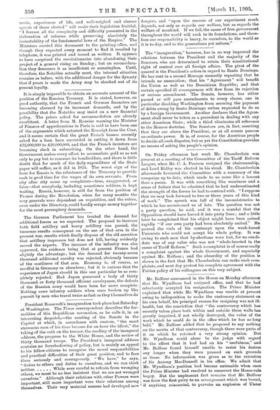The "inauguration," however, has in no way improved the relations
between the President and the majority of the Senators, who are determined to retain their constitutional right of control over all foreign affairs. The pivot of the quarrel is the President's action in regard to Santo Domingo. He has sent in a second Message earnestly repeating that he intends no annexation; that his "Agreement" will benefit the Union as well as the Dominican Republic; and that certain specified ill consequences will flow from its rejection or serious amendment. The Senate, however, has either passed or will pass amendments to every clause, one in particular disabling Washington from securing the payment of debts owing by Santo Domingo unless requested to do so by a foreign Government. Another declares that the Agree. ment shall never be taken as a precedent in dealing with any other American State ; while a third eliminates all reference to the Monroe doctrine. The Senators are, in fact, asserting that they are above the President, or at all events possess co-ordinate power. It is, of course, for the American people to decide all such disputes, but as yet the Constitution provides no means of asking the people's opinion.










































 Previous page
Previous page